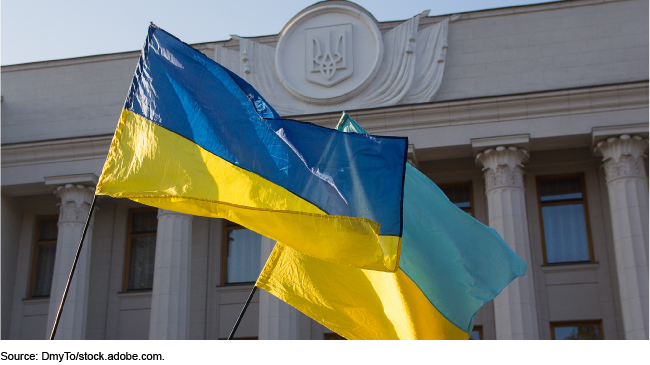Ukraine: Oversight of U.S. Direct Budget Support
Fast Facts
Russia's invasion of Ukraine is causing devastating loss of life and threatening democracy in Europe. In response, the U.S. Agency for International Development has provided $22.9 billion to the Government of Ukraine through World Bank trust funds so it can continue critical operations and services.
This Q&A report discusses:
How USAID oversees the use of this funding
How much accountability the oversight provides
Contractors are monitoring funding and conducting financial audits to determine whether funding has been used as intended. These different types of oversight have varying scopes, purposes, and levels of accountability.

Highlights
What GAO Found
Prior to 2024, the U.S. Agency for International Development (USAID) had obligated approximately $22.9 billion for direct budget support for the Government of Ukraine through trust funds managed by the World Bank. The majority of this funding was used to reimburse the Government of Ukraine for eligible expenses, such as salaries for teachers, civil servants, and healthcare workers. USAID obligated an additional $3.899 billion in direct budget support in July 2024, and plans to provide an additional $3.95 billion in 2024.
USAID, the World Bank, and other entities are overseeing the direct budget support provided to the Government of Ukraine through a layered approach. For example, USAID hired Deloitte Consulting LLP (Deloitte) and KPMG to monitor and audit this assistance. Similarly, the World Bank hired PwC to conduct additional reviews as part of the oversight process, in addition to its own direct oversight efforts. The contractors' reviews offer different levels of accountability based on their oversight approaches. For example, Deloitte is monitoring the Government of Ukraine's management of U.S. direct budget support funding to provide visibility over the use of this funding and identify gaps in processes, while KPMG is conducting financial statement audits intended to promote transparency and bolster stakeholder confidence in financial reporting. The scope of each review defines the level of accountability it can provide, and some contractors have encountered limitations in their work, such as an absence of data collected from areas in or near occupied territories. However, the multilayered oversight approach may help to mitigate some of the risks stemming from such limitations.
USAID and the World Bank plan to continue working with their contractors to conduct oversight, and other independent entities have ongoing or planned oversight work, including GAO, USAID Office of Inspector General, and the Accounting Chamber of Ukraine.
Why GAO Did This Study
Russia's February 2022 invasion of Ukraine is causing a devastating loss of life, creating a widespread humanitarian crisis, and threatening democracy in Europe. In response, Congress appropriated more than $174 billion, including direct budget support for the Government of Ukraine. This funding ensures the Government of Ukraine can continue critical operations and deliver essential services. This funding also enables the Government of Ukraine to use a larger share of its taxpayer funding to combat the invasion.
This report is part of a series of work GAO has underway evaluating U.S. oversight of Ukraine assistance. This report discusses the direct budget support the U.S. has provided, the ongoing and planned oversight established by USAID and others, and the levels of accountability this oversight provides.
For more information, contact Latesha Love-Grayer at 202-512-4409 or LoveGrayerL@gao.gov.
